
Kuppalli Venkatappa Puttappa, popularly known by his pen name Kuvempu, was an Indian poet, playwright, novelist and critic. He is widely regarded as the greatest Kannada poet of the 20th century. He was the first Kannada writer to receive the Jnanpith Award.

Girish Karnad was an Indian actor, film director, Kannada writer, playwright and a Jnanpith awardee, who predominantly worked in Kannada, Hindi, Tamil, Telugu, Malayalam and Marathi films. His rise as a playwright in the 1960s marked the coming of age of modern Indian playwriting in Kannada, just as Badal Sarkar did in Bengali, Vijay Tendulkar in Marathi, and Mohan Rakesh in Hindi. He was a recipient of the 1998 Jnanpith Award, the highest literary honour conferred in India.

Kota Shivaram Karanth, also abbreviated as K. Shivaram Karanth, was an Indian polymath, who was a novelist in Kannada language, playwright and an ecological conservationist. Ramachandra Guha called him the "Rabindranath Tagore of Modern India, who has been one of the finest novelists-activists since independence". He was the third writer to be decorated with the Jnanpith Award for Kannada, the highest literary honor conferred in India. His son Ullas is an ecological conservationist.
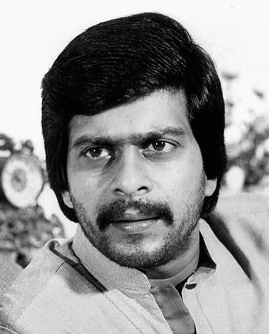
Shankar Nagarakatte was an Indian actor, screenwriter, director, and producer known for his work in Kannada-language films and television. A popular cultural icon of Karnataka, Nag is often referred to as Karate King. He directed the teleserial Malgudi Days, based on novelist R. K. Narayan's short stories and acted in some episodes as well. He won two National Film Awards, four Karnataka State Film Awards and two Filmfare Award South.
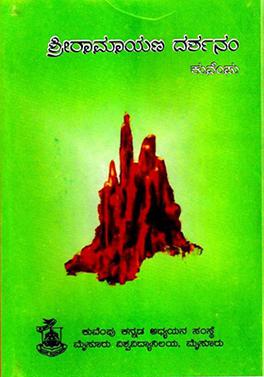
Sri Ramayana Darshanam is the most popular work and the magnum opus by Kuvempu in Kannada based on the Hindu epic Ramayana. It earned him many distinctions including the Sahitya Akademi Award and the Jnanapeeth award in 1968.

Shimoga district, officially known as Shivamogga district, is a district in the Karnataka state of India. A major part of Shimoga district lies in the Malnad region or the Sahyadri. Shimoga city is its administrative centre. Jog Falls view point is a major tourist attraction. As of 2011 Shimoga district has a population of 17,52,753. There are seven taluks: Soraba, Sagara, Hosanagar, Shimoga, Shikaripura, Thirthahalli, and Bhadravathi. Channagiri and Honnali were part of Shimoga district until 1997 when they became part of the newly formed Davanagere district.

Kuppali Puttappa Poornachandra Tejaswi was a prominent Indian writer and novelist in Kannada. He also worked as a photographer, publisher, painter, naturalist, and environmentalist. He made a great impression in the Navya ("new") period of Kannada literature and inaugurated the Bandaaya Saahitya genre of protest literature with his short-story collection Abachoorina Post Offisu. He is the son of noted Kannada poet Kuvempu.
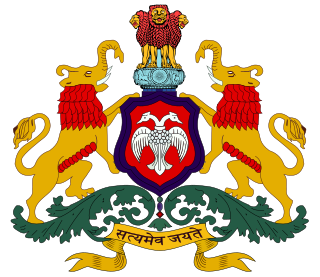
Jaya Bharata Jananiya Tanujate, Jaya he Karnataka Maate is a Kannada-language poem composed by Kuvempu. The poem was officially declared the state anthem of the Indian state of Karnataka in 2004.
K. M. Chaitanya is a film director, documentary maker and theater person. His first feature film Aa dinagalu in Kannada, won several awards including the Filmfare Awards South for Best Director and Best Feature Film in 2007. Chaitanya also won awards for Best Debutant Director by the South Indian Cinematographers' Association, Chennai Film Fans Association and Raghavendra Chitravani Award. Aa Dinagalu was listed by The Week among the top 10 Indian films of 2007. Chaitanya studied Journalism at Christ College.
Modern Kannada literature refers to the body of literature written in the Kannada language, a language spoken mainly in the Indian state of Karnataka. The Kannada script is the writing system used in Kannada literature. In the last forty years, eight modern Kannada authors have been awarded the Jnanpith award, a prestigious private literary award in India. In addition, the Sahitya Akademi Award, the second-highest award for literature granted by the Government of India, has been conferred upon Kannada writers fifty times.
Taledanda is a 1990 Kannada-language play written by Girish Karnad, an eminent person in Kannada literature, about the rise of the radical protest and reform movement, Lingaytism, in 12th century Karnataka. Karnad was awarded the Karnataka Sahitya Academy Award (1993) and the Sahitya Akademi Award in Kannada language for the play in 1994, and later awarded the Jnanpith Award for his literature work in 1998.

Anuradha, known by her stage name Tara, is an Indian politician and actress active in the Kannada cinema. She joined the Bharatiya Janata Party (BJP) in 2009 and is currently a nominated member of the Karnataka Legislative Council.
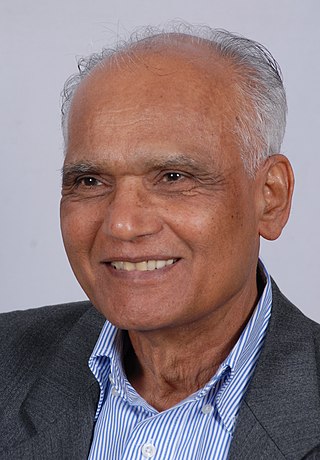
Santeshivara Lingannaiah Bhyrappa is an Indian novelist, philosopher and screenwriter who writes in Kannada. His work is popular in the state of Karnataka and he is widely regarded as one of modern India's popular novelists. His novels are unique in terms of theme, structure, and characterization. He has been among the top-selling authors in the Kannada language and his books have been translated into Hindi and Marathi which have also been bestsellers.
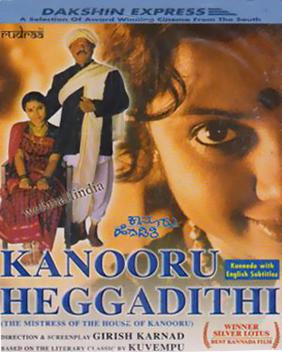
Kanooru Heggadithi is a 1999 Indian film based on the 1936 novel "Kanooru Subbamma Heggadithi" by Kannada writer Kuvempu, and directed by playwright and film director Girish Karnad. Set in the Malnad region, the film narrates a story of the land and life of a feudal family in pre-independence Malnad. The film marked Karnad's return to directing after a lapse of over a decade. This is the only instance in the Indian cinema history where one Jnanpith Awardee directed a movie based on the work of another Jnanpith Awardee.
Odakalu Bimba is a Kannada monodrama by Indian playwright and author Girish Karnad. It was written in 2005 and marked Karnad's return to direction after a period of thirty years. He directed the play with KM Chaitanya
Mysoora Mallige is a 1992 Indian Kannada-language drama film directed and co-written by T. S. Nagabharana and produced by Srihari Khoday. The story is based on a 1942 work of the same title by the acclaimed poet K. S. Narasimhaswamy. The film was an attempt to create a story based on the poetry.
Santha Shishunala Sharifa is a 1990 Indian Kannada biographical drama film directed and co-written by T. S. Nagabharana and produced by Srihari Khoday and Mahima Patel for Yajaman Enterprises. The story is based on the life of acclaimed saint poet Shishunala Sharif who wrote several moral poems striving towards social reformation. A collection of Sharif's poems are set to tunes by C. Ashwath, who also did the major playback singing. The soundtrack consisting of 16 poems was extremely popular upon release. The dialogues for this movie was written by Gopala Wajapayi, a well known theatre figure and translator of Bertolt Brecht's play The Caucasian Chalk Circle.
Aaghaata is a 1994 Indian Kannada language thriller - drama film directed by Suresh Heblikar and based on a novel by Dr. Ashok Pai. It was produced by Manasa Arts banner. Besides Heblikar, the film features Girish Karnad, Shruti and Srikanth in pivotal roles. The music was composed by Vijaya Bhaskar.

Girish Rao Hatwar, popularly known as Jogi, is a Kannada writer and journalist. Being one of the Kannada neo-literature writers, he has written short stories, novels and columns in many Kannada periodicals and daily newspapers. He has also written scripts for television serials, lyrics and screen play for movies. A journalist by profession, Jogi is currently a Magazine Editor of Kannada Prabha daily.
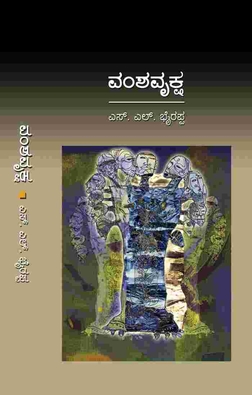
Vamshavriksha is a 1965 novel written by the popular Kannada writer, philosopher and thinker S. L. Bhyrappa. Vamshavruksha received the Kannada Sahitya Academy Award in 1966. A Kannada movie Vamsha Vriksha based on this novel, which was directed by B. V. Karanth and Girish Karnad secured Best Regional Film and National Film Award for Best Direction at 19th National Film Awards. Vamshavriksha is a nuanced exploration of love and loss, tragedy and triumph, and is interwoven with spiritual, historical and cultural insights.













